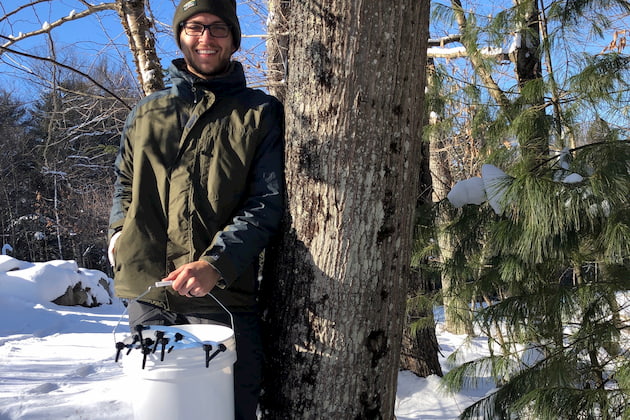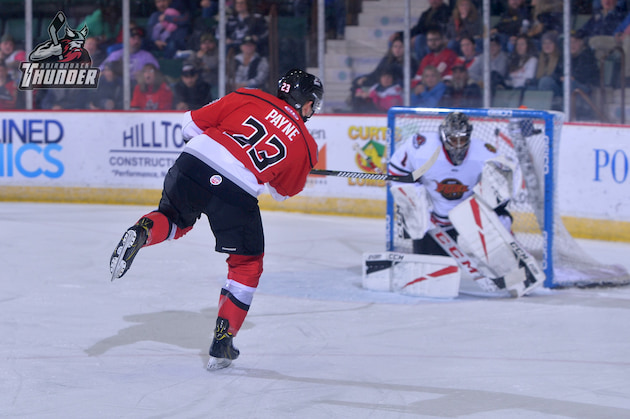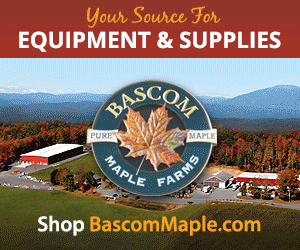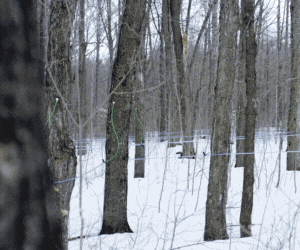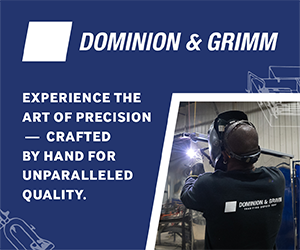Sugarmaker Profiles
Hockey All-Star for ADK Thunder makes a go of sugaring in New Hampshire
Robbie Payne of Adk Thunder taps trees in N.H.
By PAUL POST | JANUARY 23, 2020
Robbie Payne has enjoyed sweet success as an All-Star for the Adirondack Thunder, based in Glens Falls, N.Y.
From now till early April, he’ll be battling hard to help the team earn a berth in the ECHL’s Kelly Cup playoffs.
But on off days, Payne can’t wait to drive home, across Vermont, to Orford, N.H., where he’s pursuing his newfound love as an aspiring sugarmaker.
“I don’t know how far I’ll be able to get this year,” he said. “If I make a batch and it turns out well it’s going to be a good year, even if it’s just a pint. Some of the guys are asking me about it. They think it’s pretty interesting.”
Payne and his wife, Caitlin, moved to New Hampshire and bought 6.5 acres so they could be close to Dartmouth-Hitchcock Medical Center, in Hanover, where she’s in residency as a neurosurgeon.
“It’s a little over two hours from Glens Falls,” he said. “A lot of times we play Friday and Saturday, and have off Sunday. My plan is to go home and hopefully be able to take care of each tap and bucket and have them fill during the week. I don’t know exactly how it’s going to work. My wife might have to help me out a little bit. She think’s I’m crazy. But that’s all right. I want to try it out and see how it goes.”
Payne, 26 caught the maple bug while hiking with friends.
“We saw tubing all through the woods and didn’t really understand what it was,” he said. “It took me a little while to ask around. I figured out that people were tapping maple trees and it was all filtering down into big containers at the bottom of the hill. I thought, ‘That’s interesting. I have quite a bit of land, I wonder if I have any maple trees?’”
His father is a professional logger in Michigan, so Payne began sending him photos to identify the maples.
“By this point I was thinking, ‘Okay I want to try this out,’ so I started YouTubing and going online to see how it works,” Payne said. “I said, ‘I think I can do this,’ so for Christmas I asked my parents for some taps and droplines. They got me 20 of them. We’ll see how that goes for the first year here.”
“I’d love to eventually have enough where I can send out maple every year to my family at Christmas,” he said.
Veteran sugarmaker Mike “Maple Man” Bennett, of Glens Falls, started out much like Payne with a homemade, backyard operation while growing up in Granville, N.Y.
Now he’s well-known throughout the industry.
“Be careful, it’s very addicting,” Bennett said smiling. “I started out with 20 buckets and now I have 30,000 trees. You can get into spending a few thousand dollars pretty quick and it’s time consuming. But a guy like Robbie is probably going to have a lot of fun. That’s the bottom line. Even me, with 30,000 taps, I wouldn’t do it if it wasn’t fun.”
Bennett advised Payne and other beginners to seek out experienced producers. This is easiest during Maple Open House Weekends, held each year in March throughout the Northeast.
“You learn by talking to other sugarmakers,” Bennett said. “It’s an industry where people are willing to share their little tricks.”
As Payne has already discovered, there’s also a great deal of information available online.
Cornell University recently began offering a free Maple Syrup Production Beginner’s Notebook. The 155-page publication took a year to complete and has detailed information on numerous topics such as Sap Collection Systems, Sugaring Season, Syrup Production and the Sugarhouse, Selling Syrup and Financing Your Operation.
(See: https://blogs.cornell.edu/cornellmaple/)
“You can do maple syrup a lot of different ways,” said Steve Childs, Cornell’s New York State maple specialist. “The key is canning properly at 180 degrees.”
For beginners, without many taps, he advised boiling sap on a propane-fired turkey roaster, which can be purchased inexpensively at many hardware stores.
“It allows you to boil outside without taking up a lot of room,” he said. “Keep sap two to three inches deep to boil it good. You’ll probably spend as much for propane as you would buying syrup, but at least you’ve made your own. It’s good for an education, without the ash and mess of a wood fire.”
After a year or two, novices might want to invest in a small evaporator.
A small-town, rural Michigan native, Payne spent a lot of time at his grandparents’ farm, where he developed a love for the outdoors.
“Another thing I want to get into is doing apple cider,” he said. “My spring project, after the snow comes off, is planting apple trees. Hopefully I’ll get to the point where I can make apple cider in the fall.”
Payne, a forward, played four years of hockey at Northern Michigan University where he was team captain and scored 24 goals in 43 games his senior year. Immediately after, joined the AHL’s Texas Stars and split last season between there and the ECHL’s Idaho Steelheads.
The Thunder afforded both he and his wife the best chance to pursue both of their careers. Heading down the playoff stretch run, Payne is one of the team’s leading scorers (11 goals, 15 assists) and was selected to play in the ECHL All-Star Classic on January 22 in Wichita, Ks.
With a little luck, he might become a pretty darn good maple producer, too.
“I hope it goes well because I’d like to get an evaporator and build a nice sugar shack,” Payne said. “I’m in for a surprise I’m sure, but I’m pretty excited about it.”















